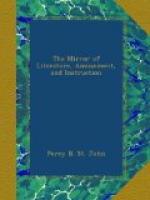“In the beginning of thriving states, when they are more industrious and innocent, they have then the fewest laws. Rome itself had at first but twelve tables. But after, how infinitely did their number of laws increase! Old states, like old bodies will be sure to contract diseases. And where the law-makers are many, the laws will never be few. That nation is in best estate that hath the fewest laws, and those good. Variety does but multiply snares. If every bush be limed, there is no bird can escape with all his feathers free. And many times when the law did not intend it, men are made guilty by the pleader’s oratory; either to express his eloquence, to advance his practice, or out of mastery to carry his cause: like a garment pounced with dust, the business is so smeared and tangled that without a Galilaeus his glass, you can never come to discern the spots of this changeable moon. Sometimes to gratify a powerful party, justice is made blind through corruption, as well as out of impartiality. That indeed, by reason of the non-integrity of men. To go to law, is, for two to contrive the kindling of a fire at their own cost, to warm others, and singe themselves to cinders. Because they cannot agree to what is truth and equity, they will both agree to plume themselves, that others may be stuck with their feathers.”
W.G.C.
* * * * *
Old weather Rhymes.
Rhymes which refer to the weather were probably written by the monks.
If St. Paul be fine and clear,
We shall have a happy year.
If St. Paul be thick with rain,
Then dear will be the price of grain.
After St. Bartholomew
Come long evenings and cold dew.
February fill dyke,
Be it black or be it white,
But if it is white,
It is better to like.
March winds and April showers,
Bring forth May flowers.
He who views his wheat on a weeping May,
Will himself so weeping away;
But he who views it on a weeping June,
Will go away in another tune.
When the sand doth feed the clay,
England woe and well-a-day:
But when the clay doth feed the sand,
Then it is well with Angle Land.
A swarm of bees in May
Is worth a load of hay,
A swarm of bees in June
Is worth a silver spoon.
A swarm of bees in July
Is not worth a fly.




